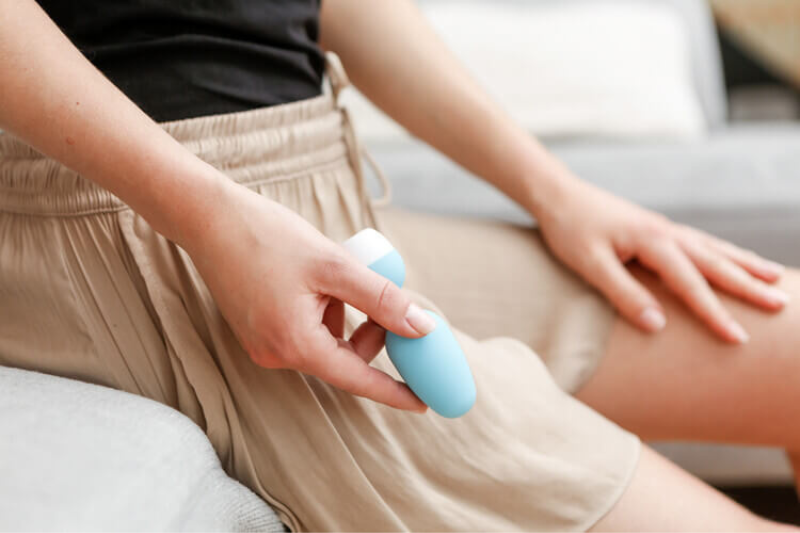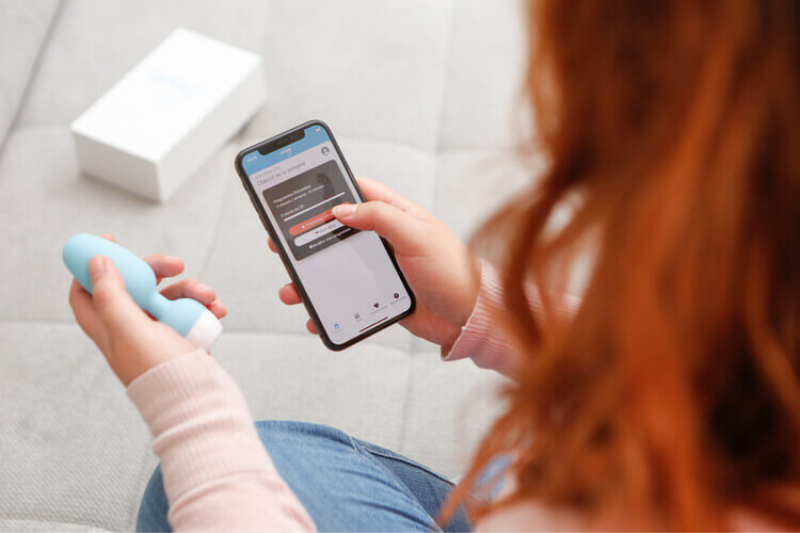
How to use a kegel exercise device?
The Emy kegel exercise device is a high-quality pelvic floor training device. It offers a practical and effective solution for women suffering from urinary leaks, pelvic pain, or other pelvic floorrelated issues. Emy is designed to adapt to the female body, with a unique shape that allows exercises while standing, sitting, or lying down for a comprehensive approach to pelvic floor rehabilitation.
Let’s discover together how to use this revolutionary device to strengthen your pelvic floor!
The Emy device: a reliable and quality product

The Emy device is made with high-quality medical materials, such as “soft touch” silicone. It ensures gentle insertion and easy cleaning. It is also waterproof for optimal hygiene and worry-free use. Additionally, the device is equipped with Bluetooth Low Energy technology, emitting waves 1000 times lower than a smartphone.
Using the Emy kegel exercise device
Using the kegel exercise device is easy and intuitive, thanks to a unique and patented biofeedback technology. The Emy device offers natural and effective pelvic floor training. It allows users to visualize in real time their pelvic floor muscle contractions.

How to use the Emy kegel exercise device?
- Preparation and setup: Make sure your device is clean. Then gently insert it into your vagina while lying down or sitting. The use of a water-based lubricant can facilitate insertion if needed
- Connect your device: Gently shake the device to turn it on and connect it via Bluetooth to the Emy app on your smartphone. Follow the app’s instructions to calibrate the device
- Perform your pelvic floor exercises: The Emy app will guide you through various fun exercises to contract and relax the muscles of the pelvic floor. Don’t worry, you’ll have visual instructions to help you perform the contractions correctly.
- Consistency is key: Perform Kegel exercises with your Emy device regularly for better results. Over time, you should be able to strengthen the pelvic floor muscles and improve bladder control. Clean the device: After each use, clean the device with warm water and mild soap. Dry it carefully and store it in its case.
how often should I do kegel exercises?
These exercises are based on the contraction and relaxation of your pelvic floor muscles. To start, it is recommended to do slow and regular contractions, holding the contraction for 5 seconds, then releasing for 5 seconds. You can repeat the exercise for 10 to 15 minutes several times a week. Over time, you can increase the duration of your perineal contraction and the number of repetitions.
When to use the kegel exercise device?
The Emy kegel exercise device device can be used to treat various issues related to the pelvic floor. For example, urinary leaks, pelvic pain, incontinence, or prolapse. By regularly using the Emy device, women will strengthen their pelvic muscles, improve muscle tone and bladder control, and reduce symptoms associated with pelvic floor issues.
Use the Emy kegel exercise device for Urinary Leaks
Urinary leaks are unfortunately common in women, especially after childbirth or during menopause. Fortunately, there is the Emy device to improve the health of your pelvic floor. This kegel exercise device is designed to help women strengthen their pelvic muscles and effectively reduce urinary leaks.


Free Pelvic floor guide
Find out how to strengthen your pelvic floor to prevent bladder weakness and improve intimate pleasure! 💥
This deviceis equipped with sensors that detect contractions of the pelvic muscles. It is easy to use and connects to a mobile application on your smartphone via Bluetooth.
Use the Emy kegel exercise device for Organ Prolapse
The Emy perineal deviceis also useful for preventing and treating organ prolapse in women. This organ prolapse, also known as prolapse, occurs when the muscles and tissues of the pelvic floor fail to support the pelvic organs. In this case, organs such as the uterus, bladder, or rectum descend and slip into the vagina. This can lead to symptoms such as:
- a sensation of pressure or heaviness in the lower abdomen
- pain during sexual intercourse
- urinary leakage
- back pain
- constipation…

By using the Emy kegel exercise device, users can strengthen their pelvic floor muscles and improve their tone. This can help support pelvic organs and reduce symptoms of organ prolapse. It is important to note that the use of this probe should be combined with other measures to prevent and treat organ prolapse. Such as consulting a specialized healthcare professional.
Use the Emy kegel exercise device for Postpartum Rehabilitation
This device is also very useful for postpartum pelvic floor training. After childbirth, the muscles of the female pelvic floor can be weakened or damaged. This can lead to issues such as incontinence, pain during intercourse, and a decrease in sexual pleasure.

The Emy kegel exercise device is designed to help women regain strength and tone in their pelvic floor muscles. By using this probe regularly, users have access to various fun Kegel exercises. They receive real-time feedback on the strength and speed of their muscle contractions, thanks to the patented technology by Fizimed.
Postpartum pelvic floor training is essential to prevent long-term health issues and to improve the quality of life for women after the birth of their child(ren). This device allows mothers to track their progress and adjust their at-home program according to their individual needs.

Free Pelvic floor guide
Find out how to strengthen your pelvic floor to prevent bladder weakness and improve intimate pleasure! 💥
Use Emy kegel exercise device for pelvic pain
This device can also be useful in relieving women’s pelvic pain. This pain can have various origins such as muscle tension, spasms, inflammation, or problems related to endometriosis. By using Emy, it is possible to relax the muscles of the perineum and pelvic floor, which can help reduce female pelvic pain.
How to recharge the Emy device?
This product is recharged wirelessly, allowing for convenient use. It can be used for over 10 years, making it a durable and cost-effective solution for pelvic floor training at home.
Strengthening the pelvic floor at any age, is it really important?
The answer is yes: strengthening the pelvic floor is essential at any age for several reasons.

Better support for intimate organs
As a reminder, the pelvic floor is a group of muscles and ligaments that support pelvic organs such as the bladder, uterus, and rectum. It is essential for the proper functioning of these organs and to prevent cases of prolapse.
Reducing the risks of urinary leaks and prolapse
On one hand, the pelvic floor is engaged daily during activities such as walking, running, lifting heavy objects, or coughing. A dysfunctioning pelvic floor can lead to urinary leaks, pelvic pain, feelings of heaviness in the lower abdomen, or even total incontinence. On the other hand, the pelvic floor is also engaged during sexual intercourse, and its tone can impact the quality of sexual life.

Strengthening the pelvic floor helps improve overall health, especially for women after childbirth. It is also important for women and men of all ages to maintain the tone of their pelvic floor. For example, by regularly doing Kegel exercises or using specialized devices like the Emy perineal device.
Can Yoga Help Strengthen Pelvic floor Muscles?
Indeed, yoga can help strengthen pelvic floormuscles, especially with specific practices. Many yoga poses naturally engage the perineal muscles, especially those involving contraction and relaxation movements.
Among the most well-known poses for strengthening the pelvic floor, we can mention the ” mula bandha,” which involves contracting the pelvic muscles in a seated position, as well as the “tadasana” or mountain pose, which can be practiced by contracting the pelvic floor muscles.
It’s also important to note that practicing yoga in general can help improve posture, strengthen abdominal muscles, and enhance blood circulation, which can contribute to the overall health of the pelvic floor.
However, it should be emphasized that if one wants to specifically target the perineal muscles, it’s best to do Kegel exercises or use a perineal device designed for this purpose. Yoga can be a useful complement to a pelvic floor training routine, but should not be considered the sole solution.


